engine overheat JEEP WRANGLER 2002 Owners Manual
[x] Cancel search | Manufacturer: JEEP, Model Year: 2002, Model line: WRANGLER, Model: JEEP WRANGLER 2002Pages: 1056, PDF Size: 12.55 MB
Page 96 of 1056
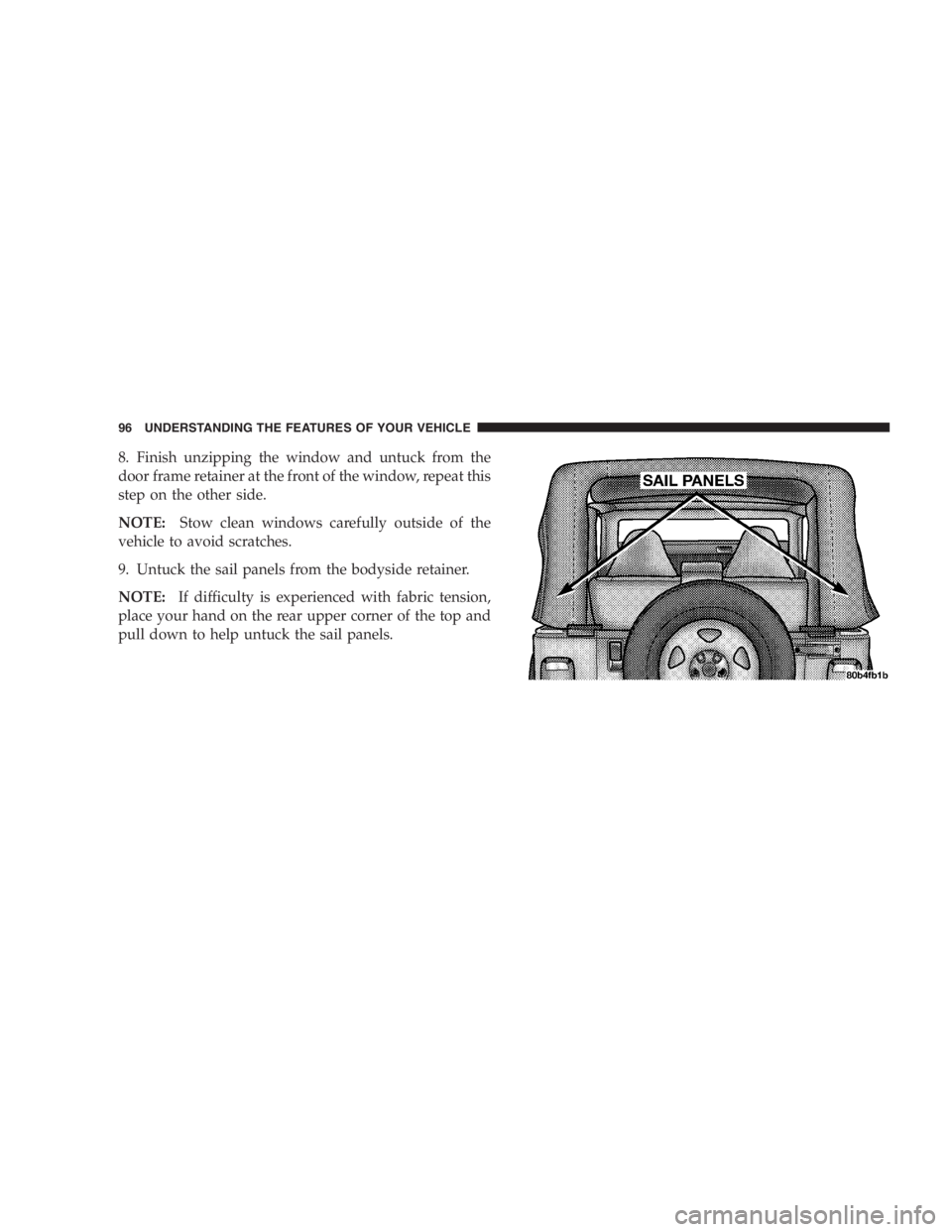
To use your brakes and decelerate more safely, follow these tips:
•Do not “ride” the brakes by resting your foot on the pedal. This
could overheat the brakes and result in unpredictable braking
action, longer stopping distances, or brake damage.
•When descending mountains or hills, repeated braking can cause
brake fade with loss of braking control. Avoid repeated heavy
braking by downshifting the transmission whenever possible.
•Do not downshift on icy or slippery roads, because engine braking
may cause skidding and loss of control.
•Engines may idle at higher speeds during warm-up, which could
cause rear wheels to spin and result in loss of vehicle control. Be
especially careful while driving on slippery roads, in close-quarter
maneuvering, parking or stopping. Remember, always engage
4-wheel drive when driving on slippery roads.
•Do not drive too fast for road conditions, especially when roads are wet
or slushy. A wedge of water can build up between the tire tread and the
road. This hydroplaning action can cause loss of traction, braking
ability, and control. Under such conditions, engage 4-wheel drive.
•After going through deep water or a car wash, brakes may become
wet, resulting in poor performance and unpredictable braking
action. Dry the brakes by gentle, intermittent pedal action while
driving at very slow speeds.
WARNING!
The weight and position of cargo and passengers can change
the vehicle center of gravity and vehicle handling. To avoid
loss of control resulting in personal injury, follow these
guidelines:
•Always place cargo evenly on the cargo floor, and locate
heavier objects as low and as far forward as possible.
•Place as much cargo as possible in front of the rear axle. Too
much weight or improperly placed weight over or behind
the rear axle can cause the rear of the vehicle to sway.
•Do not pile luggage or cargo higher than the top of the
seatback. This could impair visibility or become a danger-
ous projectile in a sudden stop or collision.
•The rear cargo space is intended for load carrying purposes
only, not for passengers, who should sit in seats and use
seat belts.
•On hardtop models, do not drive with the lift glass up. On
fabric top models, do not drive with the rear window
curtain up unless the side curtains are also open. This will
prevent dangerous exhaust fumes from entering the ve-
hicle.
Page 146 of 1056
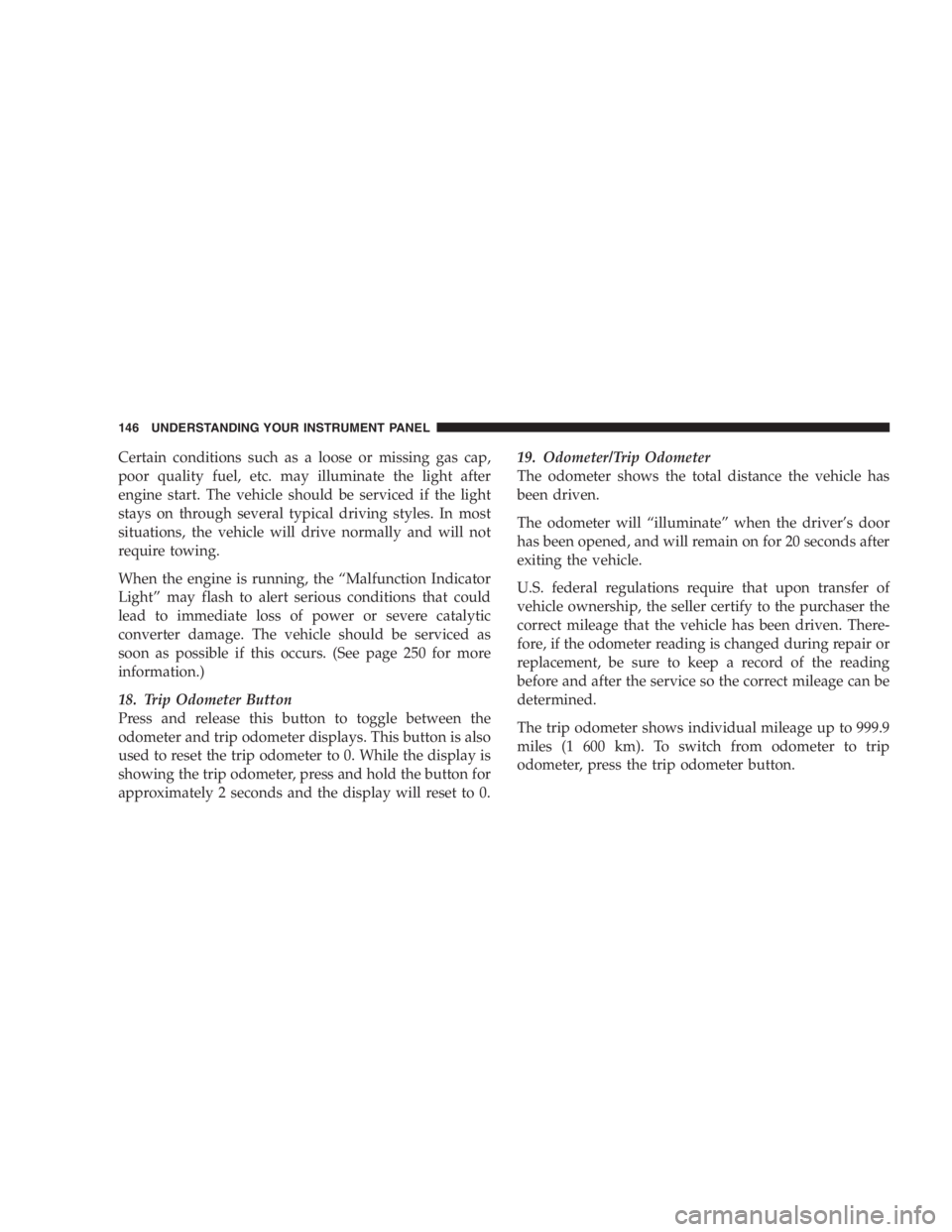
To avoid fuel spillage and overfilling, do not “top
off” the fuel tank after filling.
NOTE:When the fuel nozzle “clicks” or shuts off, the
fuel tank is full.
TRAILER TOWING
In this section you will find information on limits to the
type of towing you can reasonably do with your vehicle.
Before towing a trailer, carefully review this information
to tow your load as efficiently and safely as possible.
To maintain warranty coverage, follow the requirements
and recommendations in this manual concerning ve-
hicles used for trailer towing.Perform maintenance services as prescribed in the
“Maintenance Schedules” section. When your vehicle is
used for trailer towing, never exceed the gross axle
weight rating (GAWR) by the addition of:
•The tongue weight of the trailer.
•The weight of any other type of cargo or equipment
put in or on your vehicle.
Remember that everything put in or on the trailer adds to
the load on your vehicle.
The “D” Overdrive range can be selected when towing.
However, if frequent shifting occurs move the shift lever
to the next lower position to eliminate excessive auto-
matic transmission shifting. This action will also reduce
the possibility of transmission overheating and provide
better engine braking. Refer to “Transmission Shifting” in
this section for additional information.
STARTING AND OPERATING 229
Page 175 of 1056
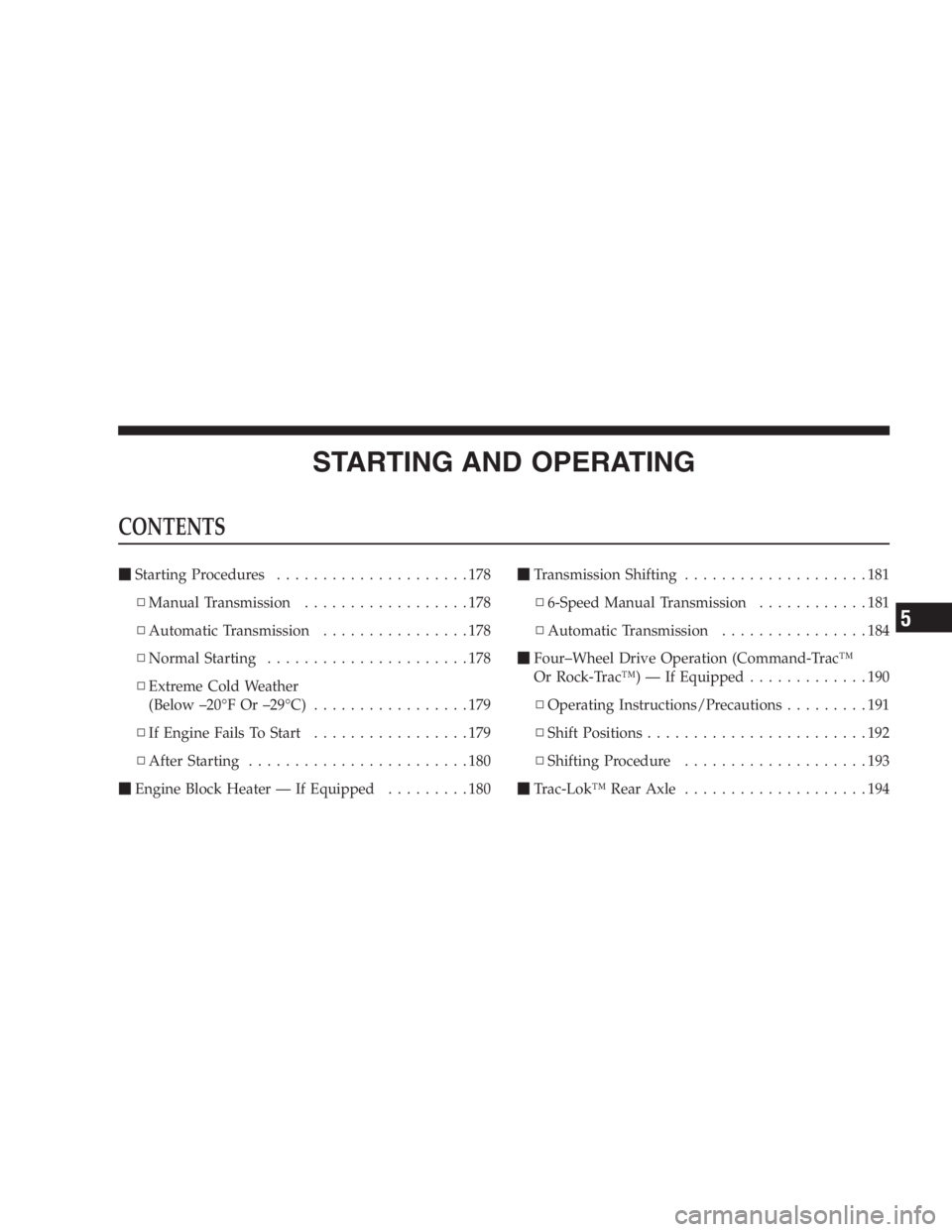
Damage to the catalytic converter can result if your
vehicle is not kept in proper operating condition. In
the event of engine malfunction, particularly involv-
ing engine misfire or other apparent loss of perfor-
mance, have your vehicle serviced promptly. Contin-
ued operation of your vehicle with a severe
malfunction could cause the converter to overheat,
resulting in possible damage to the converter and
vehicle.
Page 186 of 1056
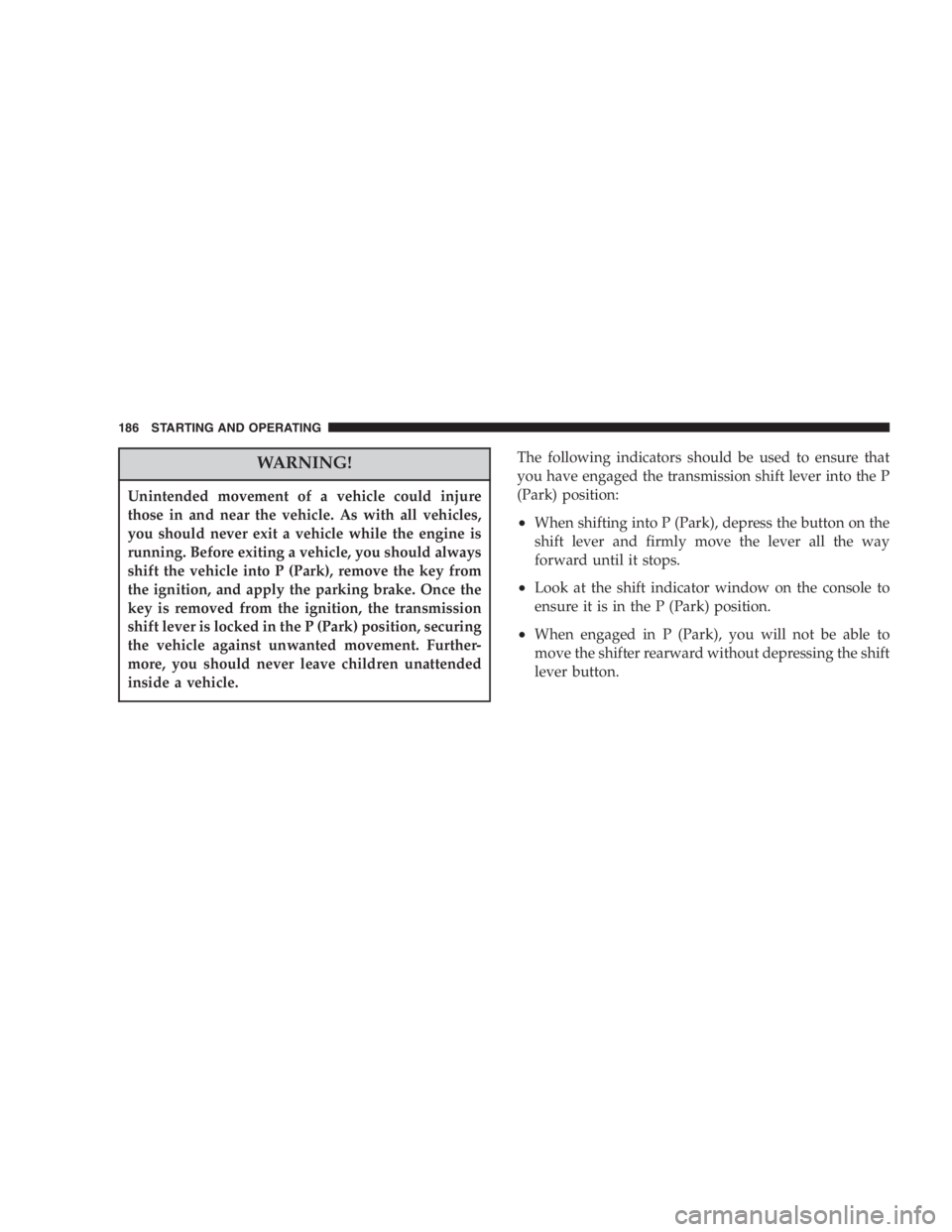
The warning words DO NOT OPEN HOT on the
cooling system pressure cap are a safety precaution.
Never add antifreeze/coolant when the engine is
overheated. Do not loosen or remove the cap to cool
an overheated engine. Heat causes pressure to build
up in the cooling system. To prevent scalding or
injury, do not remove the pressure cap while the
system is hot or under pressure.
Disposal of Used Engine Coolant
Used ethylene glycol based antifreeze/coolant is a regu-
lated substance requiring proper disposal. Check with
your local authorities to determine the disposal rules for
your community. To prevent ingestion by animals or
MAINTAINING YOUR VEHICLE 269
Page 265 of 1056
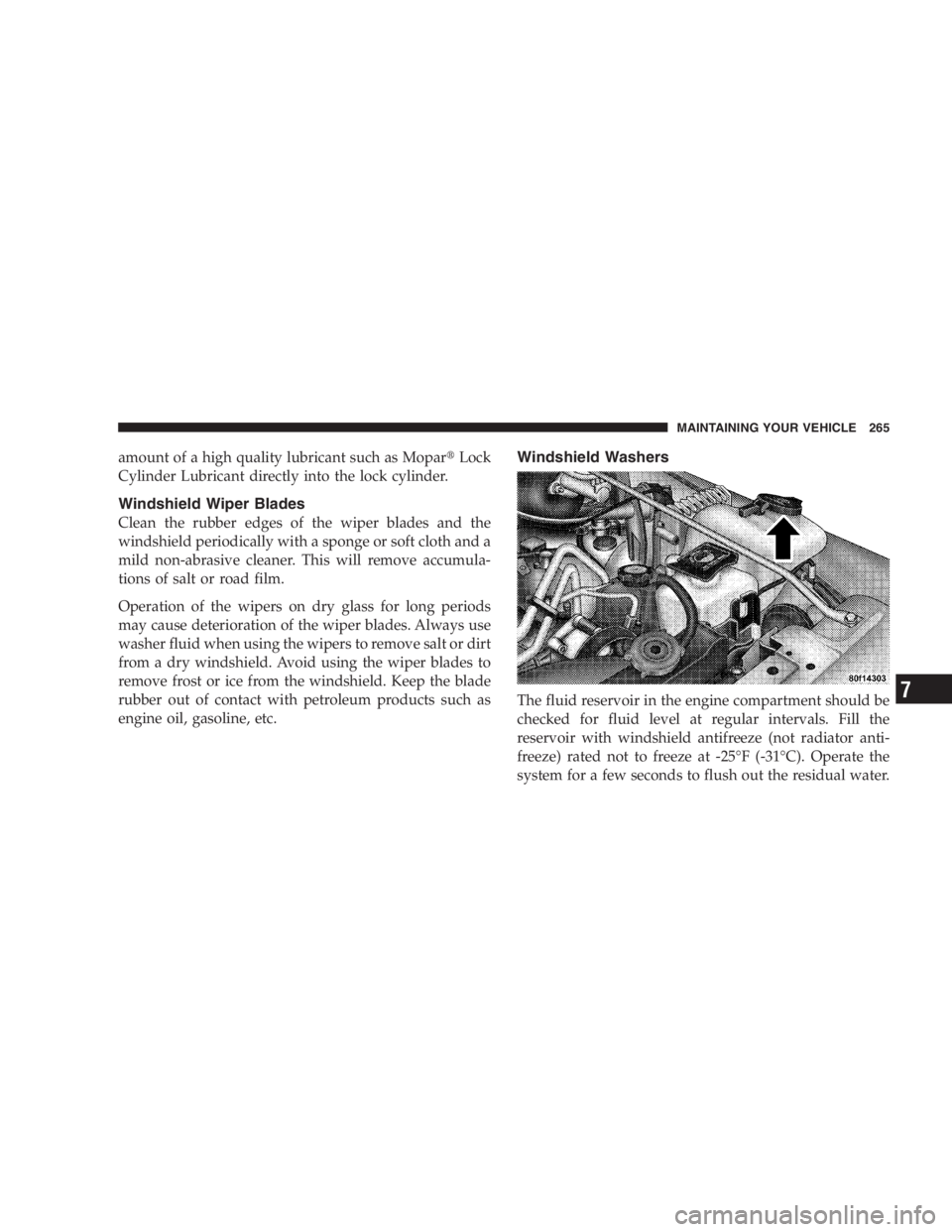
Damage to the catalytic converter can result if your
vehicle is not kept in proper operating condition. In
the event of engine malfunction, particularly involv-
ing engine misfire or other apparent loss of perfor-
mance, have your vehicle serviced promptly. Contin-
ued operation of your vehicle with a severe
malfunction could cause the converter to overheat,
resulting in possible damage to the converter and
vehicle.
Page 296 of 1056
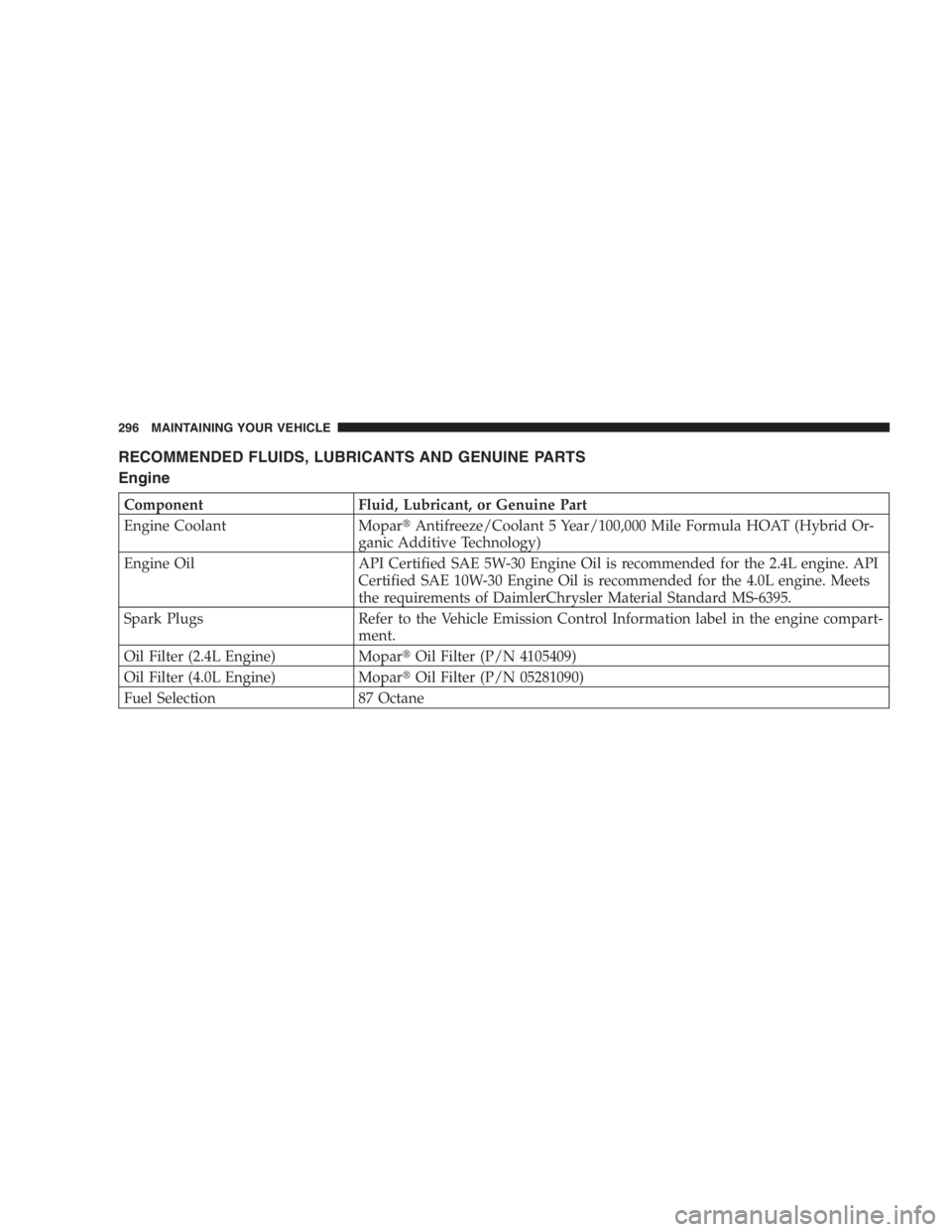
To avoid fuel spillage and overfilling, do not “top
off” the fuel tank after filling.
NOTE:When the fuel nozzle “clicks” or shuts off, the
fuel tank is full.
TRAILER TOWING
In this section you will find information on limits to the
type of towing you can reasonably do with your vehicle.
Before towing a trailer, carefully review this information
to tow your load as efficiently and safely as possible.
To maintain warranty coverage, follow the requirements
and recommendations in this manual concerning ve-
hicles used for trailer towing.Perform maintenance services as prescribed in the
“Maintenance Schedules” section. When your vehicle is
used for trailer towing, never exceed the gross axle
weight rating (GAWR) by the addition of:
•The tongue weight of the trailer.
•The weight of any other type of cargo or equipment
put in or on your vehicle.
Remember that everything put in or on the trailer adds to
the load on your vehicle.
The “D” Overdrive range can be selected when towing.
However, if frequent shifting occurs move the shift lever
to the next lower position to eliminate excessive auto-
matic transmission shifting. This action will also reduce
the possibility of transmission overheating and provide
better engine braking. Refer to “Transmission Shifting” in
this section for additional information.
STARTING AND OPERATING 229
Page 623 of 1056

To use your brakes and decelerate more safely, follow these tips:
•Do not “ride” the brakes by resting your foot on the pedal. This
could overheat the brakes and result in unpredictable braking
action, longer stopping distances, or brake damage.
•When descending mountains or hills, repeated braking can cause
brake fade with loss of braking control. Avoid repeated heavy
braking by downshifting the transmission whenever possible.
•Do not downshift on icy or slippery roads, because engine braking
may cause skidding and loss of control.
•Engines may idle at higher speeds during warm-up, which could
cause rear wheels to spin and result in loss of vehicle control. Be
especially careful while driving on slippery roads, in close-quarter
maneuvering, parking or stopping. Remember, always engage
4-wheel drive when driving on slippery roads.
•Do not drive too fast for road conditions, especially when roads are wet
or slushy. A wedge of water can build up between the tire tread and the
road. This hydroplaning action can cause loss of traction, braking
ability, and control. Under such conditions, engage 4-wheel drive.
•After going through deep water or a car wash, brakes may become
wet, resulting in poor performance and unpredictable braking
action. Dry the brakes by gentle, intermittent pedal action while
driving at very slow speeds.
WARNING!
The weight and position of cargo and passengers can change
the vehicle center of gravity and vehicle handling. To avoid
loss of control resulting in personal injury, follow these
guidelines:
•Always place cargo evenly on the cargo floor, and locate
heavier objects as low and as far forward as possible.
•Place as much cargo as possible in front of the rear axle. Too
much weight or improperly placed weight over or behind
the rear axle can cause the rear of the vehicle to sway.
•Do not pile luggage or cargo higher than the top of the
seatback. This could impair visibility or become a danger-
ous projectile in a sudden stop or collision.
•The rear cargo space is intended for load carrying purposes
only, not for passengers, who should sit in seats and use
seat belts.
•On hardtop models, do not drive with the lift glass up. On
fabric top models, do not drive with the rear window
curtain up unless the side curtains are also open. This will
prevent dangerous exhaust fumes from entering the ve-
hicle.
Page 653 of 1056

To avoid fuel spillage and overfilling, do not “top
off” the fuel tank after filling.
NOTE:When the fuel nozzle “clicks” or shuts off, the
fuel tank is full.
TRAILER TOWING
In this section you will find information on limits to the
type of towing you can reasonably do with your vehicle.
Before towing a trailer, carefully review this information
to tow your load as efficiently and safely as possible.
To maintain warranty coverage, follow the requirements
and recommendations in this manual concerning ve-
hicles used for trailer towing.Perform maintenance services as prescribed in the
“Maintenance Schedules” section. When your vehicle is
used for trailer towing, never exceed the gross axle
weight rating (GAWR) by the addition of:
•The tongue weight of the trailer.
•The weight of any other type of cargo or equipment
put in or on your vehicle.
Remember that everything put in or on the trailer adds to
the load on your vehicle.
The “D” Overdrive range can be selected when towing.
However, if frequent shifting occurs move the shift lever
to the next lower position to eliminate excessive auto-
matic transmission shifting. This action will also reduce
the possibility of transmission overheating and provide
better engine braking. Refer to “Transmission Shifting” in
this section for additional information.
STARTING AND OPERATING 229
Page 682 of 1056

Damage to the catalytic converter can result if your
vehicle is not kept in proper operating condition. In
the event of engine malfunction, particularly involv-
ing engine misfire or other apparent loss of perfor-
mance, have your vehicle serviced promptly. Contin-
ued operation of your vehicle with a severe
malfunction could cause the converter to overheat,
resulting in possible damage to the converter and
vehicle.
Page 693 of 1056

The warning words DO NOT OPEN HOT on the
cooling system pressure cap are a safety precaution.
Never add antifreeze/coolant when the engine is
overheated. Do not loosen or remove the cap to cool
an overheated engine. Heat causes pressure to build
up in the cooling system. To prevent scalding or
injury, do not remove the pressure cap while the
system is hot or under pressure.
Disposal of Used Engine Coolant
Used ethylene glycol based antifreeze/coolant is a regu-
lated substance requiring proper disposal. Check with
your local authorities to determine the disposal rules for
your community. To prevent ingestion by animals or
MAINTAINING YOUR VEHICLE 269